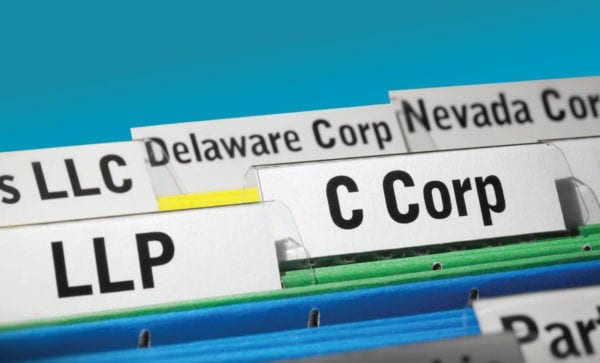North Carolina: the Tarheel State. A place for doers and dreamers, just like you. It’s home, and North Carolina is the perfect place to start your business. According to the U.S. Small Business Administration (SBA) there are roughly 900,000 small businesses in North Carolina, and as recently as 2016, those small businesses employed nearly 2 million people. For these reasons and more, North Carolina is a great place to chase your dream of becoming a small business owner.
But we’re well aware there’s a lot to know when launching a brand-new enterprise, and even more to do—not to mention the risk, uncertainty, and adversity faced by all first-time business owners. We’re here to help. One of the most significant decisions new business owners make is how to structure their business. In this regard, fresh entrepreneurs have options.
Of course, each choice has its own set of pros and cons, and each is better suited for different kinds of enterprises based on size, complexity, and the distinct nature of the business. One such structure, and among the most simple to set up, is a limited liability company, or LLC.
To have a professional quickly and easily establish your business as an LLC, use ZenBusiness. But it’s also possible to do it yourself. There’s certainly a lot of paperwork involved, but if we can do it, so can you. This guide will show you how.
1. Verify That a North Carolina LLC Is the Right Entity to Use

An LLC is just one of many ways to structure a business. Additional business structures include:
- A sole proprietorship
- A partnership
- A corporation (including C, S, B, close, and nonprofit corporations)
- A cooperative
There’s a lot to know about each kind of business structure, and there are advantages and disadvantages associated with each one. Before choosing an LLC structure for your startup, do your research: your business may be better suited by a different business structure. That being said, most small businesses—and even some that aren’t so small—begin their lives as LLCs. This designation combines many of the same business protections provided to a corporation, with the flexibility and adaptability of a sole proprietorship or a simple partnership.
Here are a few additional reasons North Carolina business owners may choose to structure their enterprise as an LLC:
- More protection: An LLC gives a founder and their business the protection they need to weather the storm and continue to grow, including shelter from business-related lawsuits and limited personal liability for business debts—because even the most successful businesses hit bumpy water from time to time.
- Flexible taxation: LLCs can also choose how they’d like to be taxed: as a sole proprietorship or as a simple partnership, or, in the case of certain kinds of LLCs, as a C or S corporation. LLCs are also eligible for pass-through taxation, part of the Tax Cuts and Jobs Act and scheduled to remain in effect until 2025. Pass-through taxation provides many benefits and advantages to both small businesses and small-business owners, including easier tax filing, double taxation protection, and easier business income tracking.
- Simple setup: Although it’s time-consuming and paperwork-heavy, establishing an LLC is fairly simple once you get started.
According to the North Carolina Secretary of State, operating a business as an LLC also provides more managerial control for business owners, while limiting the liability of members to capital contributions only, among many other benefits.
More information about all the advantages and disadvantages of structuring your business as an LLC is available from the U.S. Small Business Administration. But what’s certain is that an LLC represents a perfect middle ground for small business owners to get their dream up and running.
2. Create a Business Plan for Your LLC

Don’t begin the process of forming an LLC—or starting a business at all, for that matter—without first drawing up a business plan. Business plans are crucially important at this point of the process for a variety of reasons. When it comes to business plans, however, there’s no need for Tarheels—or anyone, from any state, for that matter—to go it alone.
Turn, instead, to expert advice and guidance from LivePlan, with more than 500 sample business plans to inspire you, and a variety of other tips and tools to make your business plan a success.
If you do choose to try writing a business plan on your own, however, here’s what you need to know.
What Belongs in a Business Plan?
No matter where you’re starting a business, it’s important that a business plan include the following information:
- A company description: Any business plan should include a detailed description of the business, covering what the business will do to make money, the product or service it provides, a mission statement, and even the planned location, or locations. Anyone who reads the plan should be presented with a clear picture of what the business concept is, what the business will do, and how it plans to be successful.
- Marketing analysis: A business plan should present a clear picture of a business’s target market, as well as a strategy for how that market will be reached. This section could include a typical customer profile, a marketing plan, and even an advertising budget.
- Financial projections: Financial projections and estimates included in your business plan should cover approximate profit and loss for at least the next five years, as well as payroll estimates and the cost of facility maintenance, among other types of overhead. These projections will change for a business over time, of course, but from the outset, a business owner should do their best to anticipate income and overhead. That way, business founders will be better prepared when the needs of the business inevitably change, while also accounting for any loans or debts the business may be carrying, and how those obligations affect the bottom line.
- Funding requirements: Does the business have the funding it needs to get started, or does it require additional revenue from investors, or from other sources of funding? These questions should be thoroughly answered in a business plan.
- Executive summary: Although the executive summary goes first in a business plan, it’s a good idea to develop this part last, after the rest of the sections have been thoroughly researched and developed. The executive summary provides a broad overview of the business plan, how the business intends to operate, and a brief summary of what is included in the upcoming sections of the plan.
Why Do You Need a Business Plan?
So why should a business owner spend their valuable time and time and energy writing a business plan? A business plan helps with three major processes:
- Planning the business
- Growing the business
- Funding the business
A business owner or group of owners may need to present a business plan to a lender to secure a small business loan, or to investors. Most importantly, though, a business plan helps clarify the founders’ vision, outlining the goods and services provided by the business, the market the business hopes to reach, and some contingency plans for when and if the business needs to pivot.
Maybe the most important part of a business plan, though, is the strategy. Writing a business plan forces a founder or group of business partners to consider some aspects of their vision that they may not have previously thought about. In doing so, these business leaders become better prepared for any unforeseen circumstances (both positive and negative) that may come their way.
Writing a small business plan can be overwhelming. To help expedite the process, many business owners seek support from online services like LivePlan, a website that offers helpful tips, pointers, and how-tos to make writing a business plan as quick and painless as possible.
3. Choose a Name for Your LLC

Business plan complete? Good work! You’re well on your way to forming an LLC in North Carolina, but there’s more work to do. Now that your business plan is right where you want it, it’s time to choose a business name.
In the world of business, what’s in a name? Would Apple be the successful company it is today if Steve Jobs had named it Computer McComputer Company? Probably not. What we’re trying to say is, names matter, and in the paperwork-heavy process of forming an LLC, choosing the name is perhaps the most fun part of all. In the state of North Carolina, there are a number of things to consider when deciding on a name for your LLC.
To take the pressure off, you can name your LLC and your business two different things. In other words, Joe’s Flower Shop may actually be North Carolina Flower Experts on the LLC paperwork. This is called an assumed name, a trade name, or a DBA (short for “doing business as”). This is also sometimes called a fictitious name. While operating a business under a fictitious name may sound a little sketchy, trust us. DBAs are legit and common, no matter where you live.
How to Reserve and Register a Name for a North Carolina LLC
To establish a DBA in the state of North Carolina, you must first make sure it’s available. The next step is to register your business name in the county in which your business is located. The business name you choose, of course, can’t already be in use by another business. To check if your business name is available, go to the North Carolina Secretary of State’s website and use the business registration search tool. Simply enter the name of your business, and search. No results? Then you and your LLC are, as they say, in business
If your business name is already taken, don’t despair. Instead, try a slight variation on the name. Make it clear in the name what industry the business is in, or type of product or services the business will offer. Those who are really stumped should return to their business plan for inspiration. The perfect business name could have been waiting there all along.
Otherwise, you can really name your LLC whatever you want in—we don’t recommend Computer McComputer Company, but suit yourself—so long as the name of the business contains the words “Limited Liability Corporation.” That can mean all three words are written out completely, or the name includes any of the following:
- L.L.C.
- LLC
- ltd. liability co.
- limited liability co.
- ltd. liability company
Once you’ve settled on the name of your LLC, the next step is to register the name with the North Carolina Secretary of State by filling out the Application to Reserve a Business Entity Name. It’s important to note that the name you choose will be reserved for 120 days. Keep that in mind if you’re still undecided. Also notable is that applications must be submitted through the mail, and there is a $30 filing fee.
If a business is using a DBA, the next step is to register an assumed business name certificate with the county register of deeds. As of 2017, an assumed business name is required by law in the state of North Carolina for any enterprise using a DBA, as a form of consumer protection. Doing so means that if issues happen to arise, citizens of the state will know the real name of the business with which they’re dealing.
Reserving and registering the assumed business name of your North Carolina LLC must be done by mail, and it costs $26. The good news is, if you’re doing business across more than one county, just indicate that on your application. That way, your DBA will be covered in whatever county you indicate your business is located, and you won’t have to pay that $26 every time your DBA is registered.
Since every business needs a website these days, it’s also a good idea at this point to search and register a web domain for your business at GoDaddy. That way you’ll know for certain a web domain associated with your business (or a logical variation of the business name you’ve settled on) hasn’t already been taken.
The last step in naming your LLC is optional, but it’s highly recommended. But once you’ve settled on your LLC name, it’s a good idea to register a trademark for your LLC name at both the state and federal level. A small business may also want to consider trademarking any logos, the company name (beyond the DBA), the product name, or really any aspect of the business that’s eligible for a trademark.
4. File Articles of Organization with the North Carolina Secretary of State

Once you’ve named your LLC, it’s time to file Articles of Organization with the North Carolina Secretary of State, Business Registration Division. In this instance, businesses have the option of filing online or by mail. Either way, the filing fee is $125, and the articles must include the following information:
- The name of the LLC.
- The name and address of each person signing the document.
- A registered agent, including their name and address (this can also be the name and address of a qualified business entity acting as your registered agent. More about registered agents at the end of this section).
- The address and phone of the LLC’s principal office. A principal office is not required. No principal office can be indicated by simply checking a box on the form.
- The date on which the articles will become effective, if different than the date on which the articles are filed.
- The signature of an LCC member, an official representative, or the organizer of the articles.
- An official email address is optional.
If you find yourself intimidated at any points of the process, online help is available from both LegalZoom and ZenBusiness. Zen Business is there to support a new business owner every step of the way, with services ranging from fast filing speeds to registered agent service, with 100% accuracy guaranteed.
With ZenBusiness, small business owners can also take advantage of a team of experienced professionals to help move the process along, and with services starting at only $49 per year, it’s more than worth it. You can also choose a higher-tier plan for an even quicker turnaround, processing your LLC formation as fast as two to four business days.
What Is a Registered Agent?
Did seeing the term “registered agent” on that list of requirements for your articles of incorporation surprise you? A registered agent is nothing more than a person designated to receive all government paperwork and important legal documents related to your business. That includes the following:
- Court papers, in the event your business is sued (lawyers sometimes call this “service of process”).
- Tax notices and business registration renewal notices from the Secretary of State.
Once that person is designated from within your business, that person is registered with the Office of the Secretary of State. And from that point forward, that person will receive all important business-related documents from the government. The registered agent can be a private individual, though many business entities provide this service as well.
Before choosing a registered agent, it’s important to note that not just anyone can fulfill the role. In North Carolina, a registered agent must satisfy the following requirements:
- The registered agent must be a resident of North Carolina, or a business entity registered to do business in the State of North Carolina.
- The registered agent must also have a physical address within the state.
- The registered agent must have a street address, and PO Boxes are not allowed.
5. Create an Operating Agreement

Though highly recommended, the next step in the process of starting an LLC in North Carolina isn’t actually required: preparing an operating agreement. An LLC’s operating agreement outlines the rights, duties, obligations, and liabilities among the members of the LLC, keepings things clear and concise if any disagreements should arise.
What to Put in Your Operating Agreement
At a minimum, an operating agreement should include the following information:
- Organization: When and where was the company created?
- Owners of the company (“members”) and ownership structure
- Management of the company
- Voting rights of members
- Capital contributions: What is each member putting into the company?
- Distributions: How will profits or losses be shared?
- Membership changes: What is the process for adding/removing a member and transferring ownership?
- Dissolution: Exit strategies and what happens when the company closes its doors
When it comes to an operating agreement, there’s nothing to submit or keep on file with the state. Instead, an operating agreement is kept between the interested parties of the LLC. If no operating agreement is developed, the following documents, common in any LLC, can easily stand in its place:
- Limited liability company agreement
- Member control agreement (in the event the LLC is member-managed)
- Existing articles of organization
- Bylaws
Why Operating Agreements Are Important
As previously mentioned, operating agreements are optional in the state of North Carolina, they can be crucial documents in the formation of an LLC. Here’s why they’re important:
- Clearly outlines owner’s rights, responsibilities, and capital investments
- Records the percentage each owner has in the company
- Outlines policies and procedures for membership changes and ownership transfers
Significant conflict can arise within an LLC If any of these points are not clearly understood from the get-go, and a clear understanding between business owners facilitated by an operating agreement can help preserve the company (and even some personal relationships) should disagreements arise.
It’s even recommended, in fact, that a single-person LLC take the time to develop an operating agreement as a means of formalizing (even just in the mind of the business owner) where individual responsibility ends and the company’s responsibility begins.
How to Write an Operating Agreement
Operating agreements are relatively simple documents, and sample operating agreements tailored to specific states can be found online. Operating agreement templates are also included with the ZenBusiness business formation package. To develop your operating agreements with the help of an attorney, or to have a qualified attorney review your operating agreement, consult LegalZoom.
7. Apply for a Federal EIN

The only thing that is certain in life (and business) is taxes, and a federal EIN (employee identification number) is a tax and regulatory requirement for any LLC, regardless of the state in which it operates. Here’s what you need to know about an IRS Employee Identification Number.
The only thing that is certain in life (and business) is taxes, and a federal EIN (employee identification number) is a tax and regulatory requirement for any LLC, regardless of the state in which it operates. Here’s what you need to know about an IRS Employee Identification Number.
Why You Need an EIN
An EIN is required if your LLC has more than one member. An EIN, sometimes called a tax ID number, is a nine-digit number that is assigned by the Internal Revenue Service and unique specific business entities that operate in the U.S. During taxation and used for the purposes of identification.
A federal EIN is also required when opening a bank account for your LLC. That’s true even if the LLC has no actual employees.
Available from the IRS, an EIN application can be completed entirely online. Best of all, there is no filing fee. Even a single-member LLC must apply for an EIN if it chooses to be taxed as a corporation rather than a sole proprietorship. ZenBusiness includes an EIN service in their pro and premium business formation packages.
8. Open a Company Bank Account

At this point, it’s time to open a business bank account for your LLC. It’s necessary to keep your personal banking separate from your business banking for a variety of reasons.
Most importantly, separate personal and business accounts help you easily track business transactions to keep your bookkeeping up to date. Separate bank accounts also reduce headaches at tax time. With separate accounts, business owners also spend less time filing and retrieving receipts, and there’s less risk of losing or misfiling important documents.
Establishing a business bank account is a bit more complicated than setting up a personal bank account, however. Don’t head to the bank without the following documentation:
- Copies of your filed Articles of Organization
- A signed Operating Agreement
- A Federal EIN number
- Two forms of personal identification
When it comes time to open an account, which bank should you choose? For a national bank, we suggest the following:
- Chase: Chase Bank owns and operates hundreds of ATM and branch locations in the state of North Carolina. Chase Bank will be there to serve you and your LLC any time of the day or night.
- Wells Fargo: With more than 200 banks and 600 ATM locations in North Carolina, including Durham, Asheville and other major cities in the state, Wells Fargo is another great banking option for your LLC.
There are some advantages to choosing a local bank, however. Local banks face more competition, offering higher rates on their accounts, more free services, and often more personalized service. Consider the following local North Carolina banks for your business account:
- First Carolina Bank: With branches conveniently located in cities all across the state, including Raleigh and Wilmington, First Carolina Bank is a great choice to provide the banking services your LLC needs to be successful.
- Carolina Alliance Bank: Now part of the Park National Organization, Carolina Alliance Bank is another great local banking option for North Carolina LLCs, especially for LLCs located in the western region of the state.
- Aquesta Bank: LLCs in North Carolina can enjoy free business checking from Aquesta, with numerous locations all across the region.
In addition to a bank account, it’s also a good idea to apply for a small business credit card. Like a bank account designated for business transactions, a specific credit card used for business purposes will help keep your finances organized, make tax season as smooth as possible, and otherwise, help make book keeping a breeze.
Credit card companies also want small business clients, so they offer many competitive advantages such as cash back and airline miles, among other incentives. Just like your personal credit, though, it’s important to treat your business credit card like a debit card and never spend money you or your business can’t afford to spend.
Set Up Business Bookkeeping
Although it is possible for small business owners to keep their own books, it may also be worth considering a bookkeeping service. Either way, keeping thorough and detailed books for your business is crucially important. Business owners may need to present their books for legal and financial reasons, or if the business should happen to be audited by the IRS, including financial documents such as income statements, balance sheets, and cash flow statements.
As we said, it’s possible for a business owner to keep and maintain their own books, or to hire someone to take care of the books in-house. Quickbooks is perhaps the most common tool used by small businesses who choose to go the DIY route with their bookkeeping. Since most small business owners have a lot on their plate already, many hire a bookkeeping service in their area, which can sometimes prove to be more affordable than keeping a full-time bookkeeper on staff. Additional bookkeeping options for a small business include a cloud solution, like Bench.
9. Pay Business Taxes

In addition to paying federal tax, your LLC in North Carolina will need to pay North Carolina state taxes. Since LLCs enjoy pass-through taxation, this responsibility falls not on the LLC itself, but on the individual members of the LLC—or to put it another way, LLCs don’t pay income tax, you do. The advantage of pass-through taxation is the money only gets taxed once, and the business itself gets taxed only once and gets to keep more of its money.
If a business owner doesn’t want to take on all the responsibility of the business income in their personal taxes, however, LLC owners in North Carolina can choose to have their LLC taxed like a corporation by filling out the form 2553 with the IRS. Additional good news is that, unlike some states, North Carolina has no additional fees charged simply for the privilege of doing business.
Like most states, though, North Carolina has a corporate income tax of a flat 5% on taxable income. There is also a corporation franchise tax in the State of North Carolina, and many LLCs will be subject to the tax. Both these taxes can be paid online to the North Carolina Department of Revenue, using the corporation income tax return form CD-405.
For more information about LLC taxes in the state of North Carolina, consult a tax attorney.
10. Hire Employees

Not every new LLC needs to hire employees, but many do. If employees aren’t in your future, you can skip this section, but if your LLC needs to bring on extra help, there’s a lot to know about hiring employees in the state of North Carolina.
First, it’s important to understand the difference between employees and contractors.
In brief, an independent contractor is in business for themselves and works when and how they choose. For example, an employer cannot schedule an independent contractor to work a specific shift. Instead, an independent contractor is hired to provide one specific service or complete a task on their own terms and in their own time.
That’s not to say an employer can’t institute a deadline with a contractor, it simply means the employer can’t dictate when and how that deadline is met. The trade-off for less control with an independent contractor is that an employer isn’t required to pay benefits, like paid time off or health insurance.
The advantage of hiring an employee is that the employer has complete control of when they do their work, within the limits of labor laws. However, the employer will also be responsible for all the additional fees and expenses of keeping an employee on staff.
Otherwise, when it’s time to hire an employee, a business owner will want to check in with the North Carolina Department of Employment Security. There, employers can find everything they need to get started, from creating an employer account to paying taxes and how to comply with all unemployment requirements.
A payroll service is another important box to check for an LLC that will be hiring an employee. Some choose to bring their payroll department in-house, or hire a local payroll service in their area. Another option that can sometimes be more cost-effective is to choose an online payroll service provider like Gusto. Gusto is very user-friendly, and integrates easily with the Bench bookkeeping solution. With Gusto, employers can easily set up health and retirement benefits, pay independent contractors, track time, and more.
11. Apply for North Carolina Licenses and Permits

The next step in the process of establishing an LLC in North Carolina is to apply for all relevant business licenses. The kind of business licenses your LLC will need depends on the nature of the business and where the business is located. Even the city in which your business is operating may require specific licenses. The county clerk in the city or county where your business will primarily operate can tell you what local business licenses you may need. The state boards and commissions website will fill you in about licenses required at the state level.
In North Carolina, you also need to register your LLC with the North Carolina Department of Revenue, which you can do online. There are also a number of annual reports that must be filed in order to keep your LLC registration current. These reports can be filed through the Secretary of State Online Annual Report Editor, or on paper through the United States Postal Service. Filing through the mail, however, is generally only required if an LLC is changing the name of the registered agent.
Filing through the mail is slightly less expensive than filing online. The filing fee online is $202, while filing through the mail will cost you $200. It’s only $2, but when you’re starting a business, every penny counts. For additional help with business licenses, consult LegalZoom’s business license tool.
It’s also important to note that the “annual” in these annual reports is based on the tax year—April 15 to April 15. In other words, if you form your LLC after April 15 in any given year, the annual report won’t be due until the following April 15. Form your LLC even just a little bit before April 15—even if it’s just a matter of a few days or weeks? Yeah, you’re going to have to file your annual report on April 15 anyway.
Just something to keep in mind when finalizing your plans for an LLC.
12. Protect the Owners and the Company

Congratulations! The journey of forming an LLC is almost complete. Although there’s no way to completely mitigate the risk of starting a business, business owners can take small, simple steps to lessen their culpability in the event something should go wrong with the business. Like many things about launching an LLC, the best way for a business owner to protect themselves is to have all their paperwork in order, including the following documents:
- An Operating Agreement
- Documents related to the formation of an LLC
- A company bank account
- A business credit card
- All relevant licenses and permits
Just having your paperwork in order isn’t enough, however. It’s also important that all documents are signed correctly, which means they’re signed by the business rather than by you, as an individual—a small but important distinction.
Here’s how we structure signature sections on contracts in order to reflect the separate legal existence of the company. Feel free to steal this:
Agreed to:
_[Your Company Name]_
By: _Your Signature_
Its: _Founder and Owner [or whatever other title you use]_
Get Insurance
At this point in the process, a small business will also want to insure their business is properly insured. There are many different kinds of small business insurance. To find out which kind your business needs, it’s best to work with a consultant. For now, here’s a brief overview of the different kinds of small business insurance:
- General liability insurance protects your business from claims of bodily injury, property damage, libel, and slander.
- Commercial property insurance secures everything from tools and equipment to inventory and even furniture.
- Income insurance keeps your income stable in the event of a fire, wind, or some other kind of damage that could force your business to close.
- Workers’ compensation insurance helps pay for medical care, disability benefits, lost wages, and even funeral arrangements after a work-related injury.
- Commercial auto insurance protects you in the event of an accident if your business requires any driving. Commercial auto insurance is particularly important if anyone involved in the business leases, rents, or owns a company vehicle. It’s also required if an employee drives their own car for work.
- Professional liability insurance keeps you and your employees covered should a mistake happen in the context of the business, protecting you and your business from any possible litigation.
- Data breach insurance helps pay for any possible patient, client, or customs expenses in the event of breach, to hire a public relations firm to handle any negative publicity, and even perhaps paying for credit monitoring services for your clientele should an incident occur.
There is likely an insurance broker in your area, but a leading online small business insurer like Hiscox can help your small businesses find the insurance you need, including cyber-security and short-term liability among many other forms of coverage.
13. Protect Your Intellectual Property

It may now be time to protect any intellectual property associated with your business. Protecting your intellectual property goes beyond just ideas, concepts, and prototypes. It also defends assets crucial to the success or failure of your enterprise. There are many different ways to protect your intellectual property, such as the following:
- Trademarks
- Copyrights
- Patents
- Trade dress
- Trade secrets
It’s easier than one might assume to properly protect your intellectual property, and you can complete the process entirely online. You can apply for a variety of different kinds of intellectual property protection through LegalZoom. For additional information or assistance, it’s also possible to consult a lawyer.
For more information about three of the most common forms of intellectual property protection and to begin the process of applying for one, consult the following websites:
- Copyright: The owner of a copyright is granted exclusive permission to copy a creative work for a limited time only.
- Trademark: Trademarks most often protect signs, logos, slogans, or other identifying marks differentiating one business from another.
- Patent: Patents protect inventions from being produced by a competing business.
Protecting your intellectual property extends beyond your competitors, however. Valuable data and information crucial to your business success is also vulnerable from within. Consider the following forms and contracts to help make sure your intellectual property won’t leak out through employees and contractors.
Non-disclosure or confidentiality agreements are legal contracts between a business and their employees from divulging sensitive information about products, processes, policies, practices, goods, and services, among many other forms of property at the core of your business, both while the individual is employed at the company, and after the employment has been terminated.
An independent contractor agreement helps protect intellectual property shared with an independent contractor, and should be considered any time an independent contractor is brought on board. An independent contract agreement should always include a confidentiality clause, among other facets like employment terms, responsibilities and deliverables, and contract termination.
Work made for hire agreements are another kind of intellectual property protection contract. These contracts come into play when an employee or independent contractor creates something that might otherwise belong to the creator, but in this instance belong to the business, company, or corporation that initiated the work.
Non-compete agreement is another to consider. An employee or independent contractor could take a good idea and start a competing business of their own. Signing a non-compete agreement, sometimes called a restrictive covenant, with all employees, independent contractors, and even possibly among partners, can help prevent this from happening.
Non-solicitation agreements are the last kind of intellectual property protection a business owner should consider extending to their staff and contractors. A non-solicitation agreement is a provision in any employment or work made-for-hire agreement stating that an employee will not solicit the customers of your business while they’re employed, or after their employment has been terminated.
Free forms and templates for each of these kinds of intellectual property contracts are commonly available online. Additional resources and information and help protecting your intellectual property, use the intellectual property portal on LegalZoom.
14. Comply with Local Tax Requirements

Though in some states and municipalities LLC fees are one-time fees, in North Carolina, the costs associated with forming an LLC don’t stop once the process is complete.
Many states and even cities charge LLCs annual fees, and of course each state is different. In addition to the $125 filing fee, LLCs in North Carolina are required to pay an annual $200 fee to stay current.
Here are some additional tax liabilities that North Carolina business owners should be aware of:
- North Carolina business owners must pay self-employment tax on business profits.
- There is also a North Carolina state tax on all profit after state deductions and allowances.
- North Carolina LLC owners are also liable for federal income tax, minus federal allowances and deductions
- Depending on the business, a North Carolina LLC may also be required to pay sales tax on certain products, such as furniture, appliances, and vehicles. Some services rendered in North Carolina are also subject to a sales tax. Medicine, groceries, and gasoline are all exempt.
- Salaries paid to employees are also subject to tax in North Carolina.
- And employees of a North Carolina LLC are also on the line for state, payroll, and federal taxes on their earnings.
When it comes to LLC tax advice, however, this just a start. For additional advice on how to comply with all North Carolina LLC tax requirements, consult a tax attorney.
Conclusion

And there you have it! Without a doubt, other factors will likely come up for you along the way as you form your LLC, but these are the basics.
To review, operating an LLC is a common business structure for many small businesses. It offers business owners many advantages and protections, including protection from business-related lawsuits, as well as shielding owners from personal liability for business debts.
Once an enterprise is incorporated as an LLC, business owners continue to enjoy the advantages of an LLC. These include an adaptive management structure, liability protection, and some tax advantages
When it comes to starting an LLC, each state has slightly different rules, regulations, costs, and fees. No matter where you are, however, starting an LLC includes the following steps: choosing a name, appointing a registered agent, filing articles of organization, finalizing an LLC operating agreement, ensuring compliance with all tax and regulatory requirements, and filing annual reports.
The steps to forming an LLC in North Carolina are as follows:
- Reserve the name by filling out the Application to Reserve a Business Entity Name with the North Carolina Secretary of State.
- Appoint a registered agent, which can be a private individual, or a business entity providing the service.
- File Articles of Organization with the North Carolina Secretary of State, Business Registration Division. Articles of organization can be filed either online or through the mail. In North Carolina, the filing fee is $125.
- In North Carolina, you also need to register your LLC with the North Carolina Department of Revenue, which can be done online. There are also a number of annual reports that must be filed in order to keep your LLC registration current. These reports can be filed through the Secretary of State Online Annual Report Editor, or simply through the USPS.
- Though recommended, the next step in the process of starting an LLC in North Carolina isn’t actually required. Preparing an operating agreement for your LLC simply outlines the duties, rights, obligations, and liabilities of all interested parties.
Complying with all tax and regulatory requirements is also a crucially important part of owning and operating and LLC. That includes applying for an EIN from the IRS. You must also stay up to date with all relevant business licenses required by the city and state. Check with the county clerk in the city or county where your business is located for more information. State boards and commissions websites can fill you in on what you might need at the state level.
And congratulations, you’re done!
Phew — that was a lot. Still with us? We know you have a lot to worry about when it comes to starting a business. Hopefully this guide made your life a little bit easier.
To save yourself the headache and to make certain that all your LLC t’s are crossed and i’s are dotted, let ZenBusiness take care of the whole process for you. While there are no guarantees, taking the time to start an LLC will go a long way toward helping you be successful in business in the great state of North Carolina.
LLC Resources
How to Start an LLC in California
How to Start an LLC in Florida
How to Start an LLC in Texas

